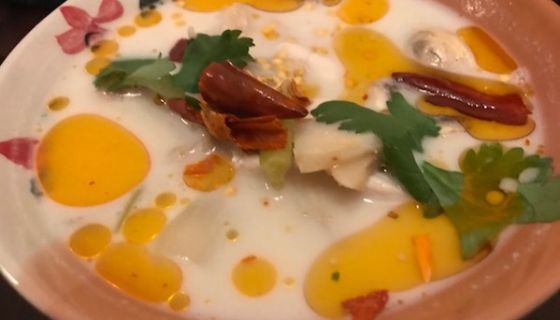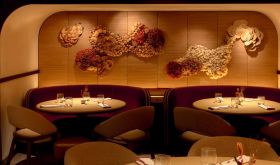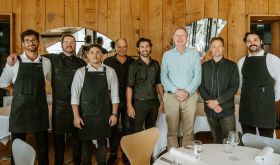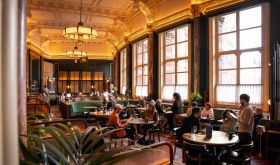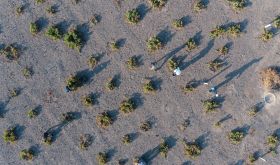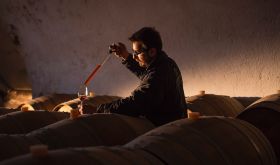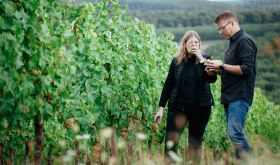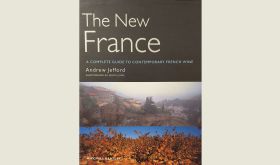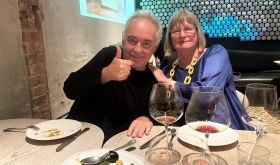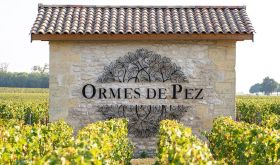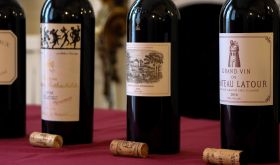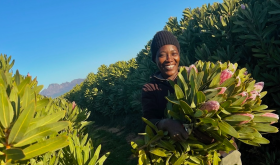London shares with perhaps only Amsterdam a distinctive historical advantage with respect to its restaurants and their approach to food.
The great adventures that took merchant ships east from both cities in the 17th and 18th centuries left a spicy legacy. Both cities today would be a lot poorer without the Indonesian restaurants of Amsterdam and the Asian restaurants of London.
And as the idea of being a restaurateur appeals today as a way of life to the younger generation, as opposed to the only way of life that was available to many of their parents, so certain restaurants are undergoing a renaissance under a younger, family management.
That is certainly the case at A Wong near Victoria, where Andrew Wong now runs the kitchens of his former parents’ restaurant. It was originally called Kym’s, the name that Wong has given to a second restaurant he will open in the City in early October, having abandoned the name 1908, the first year a Chinese restaurant opened in the United Kingdom, apparently.
A similar, and similarly beneficial, effect has been felt in what for 40-odd years was a hidden corner of Thailand by London Bridge.
It was in 1975 that Suchard Inngern first landed in London with £20 in his pocket. Having been brought up in an orphanage in Bangkok, he knew the value of hard work and soon enrolled in a restaurant kitchen. There he honed his skills before embarking on his own, initially in a restaurant called Suchard on Tooley Street, close to London Bridge, that still thrives. Fifteen years ago he took over what had been a friend’s pub on nearby Crucifix Lane, to which he added a Thai menu, calling it Suchard’s Free House. He subsequently moved in upstairs with his wife and three children.
Eighteen months ago, and beginning to feel his age, Inngern, now 66, realised that two restaurants was one too many and he planned to sell his second one. But he had not counted on opposition from his family.
Now in their twenties, his two sons and one daughter – Bank, Shakris and Roselyn – appreciated that this was the opportunity that they had been waiting for. Having grown up in the family restaurant, they realised that they were unlikely to be given a second chance so readily. And with that came the opportunity to express a more modern, more youthful face of Thai food. Suchard is pictured below, flanked by Bank and Roselyn.

In March, after what Roselyn describes as ‘an emotional year’, the builders moved in. Out went the pool table, as well as the chandelier above it, and the slot machines. In came a far more modern and more sympathetic interior. The glass frontage, complete with the etched panes from the pub era, remains and allows in plenty of natural light.
In came a new name, as well. Kin and deum in Thai means simply to eat and to drink, the two activities that lie at the heart of the new owners’ approach. The menu is much shorter than it was, as is their drinks list and their range of particularly good cocktails. When the builders, typically, ran late and over budget, Roselyn managed to attract some cash flow via Deliveroo. The restaurant finally opened on 4 July this year.
The biggest challenge rests with Bank, now in charge of the kitchen. Offering a shorter menu to diners not supremely well versed in the nuances of Thai food could result in a simple list of tried and tested dishes.
But innovation is obvious even on the shorter lunch menu. A dish described as Siam aubergine is hot and spicy; the Thai dumplings are equally so; while Bank’s Massaman chicken curry was splendid with lots of colour, lots of chicken, lots too of a subtle curry sauce flowing with coconut milk, red chillies and topped with cashew nuts (above right). A side dish of morning glory greens with chilli and garlic hit the spot.

Then there was my introduction to ‘kanom thai’. These are the country’s many, very sweet desserts made here by ‘aunties’, Thai women who have been friends of the senior Inngerns for many years. On the day we ate lunch there the ‘kanom thai’ was blue, sticky rice topped with a form of crepe, topped in turn by cream. It was too sweet. Tub tim krob, or pieces of red jelly floating in coconut milk, was less of an assault on the teeth.
The longer dinner menu begins with one Thai speciality, tamarind eggs. These delicious snacks are completely transformed in colour and intensity from having been baked in their shells with the addition of tamarind.
A dish of salted basil chicken was potent and fresh, as was a bowl of tom kha, coconut milk soup enlivened with lime juice, fish sauce and galangal. Hottest of all was a dish described on the menu as Bangkok GraPow – the three red chilli symbol next to it should have been sufficient warning. This is a steamy dish of minced pork in which the addition of holy basil leaves play an important, and welcome, cooling role.

The transformation of Suchard’s Free House into Kin + Deum seems, to judge from the number of customers, to have met a local need, and to have brought the Inngern family even closer. 'My father seems to have taken on a new lease of life since we opened', Roselyn reported with typical Thai warmth.
Kin + Deum 2 Crucifix Lane, London SE1 3JW; tel +44 (0)20 7357 7995. Dinner for two with a cocktail each was £65.

